Overview
The article outlines ten essential tips for achieving success in construction generator rentals. It emphasizes the critical importance of:
- Assessing power needs
- Reviewing maintenance records
- Understanding rental agreements
Each tip is fortified with practical advice and statistics that underscore the necessity of careful planning and informed decision-making. This approach not only helps avoid project delays but also ensures reliable equipment performance.
Key Highlights:
- EZ Equipment Rental is a leading provider of construction generator rentals in the Dallas-Fort Worth area, offering a wide range of equipment.
- Key rental options include commercial, diesel, electric, and towable units, ensuring flexibility for various project needs.
- Assessing total wattage requirements is crucial; selecting a generator with at least 20% extra capacity helps accommodate power surges.
- Diesel generators are more fuel-efficient and suitable for heavy-duty applications, while gasoline units are ideal for smaller tasks.
- Requesting maintenance records is vital to ensure equipment reliability and to avoid costly delays due to equipment failure.
- Thoroughly reviewing rental agreements helps clarify lease terms, costs, and responsibilities, reducing the risk of misunderstandings.
- Noise levels of generators should comply with local regulations, particularly in residential areas, to avoid fines and complaints.
- Inquiring about delivery options ensures timely access to equipment, which is critical for project timelines.
- Robust customer support is essential; 70% of construction supervisors highlight the need for prompt assistance to prevent delays.
- Comparing rental prices should include all associated costs, such as delivery and maintenance fees, to find the best value.
- Customer reviews significantly influence rental decisions; positive feedback enhances company reputation and attracts new clients.
Introduction
In the dynamic world of construction, the reliability of power sources, particularly generators, is crucial for ensuring seamless operations. Construction managers can significantly enhance project efficiency and minimize downtime by implementing effective strategies for navigating the complexities of generator rentals. However, the challenge often lies in understanding the nuances of rental agreements, power needs, fuel options, and customer support. To guarantee a successful generator rental experience, it is essential to follow key tips that address these critical aspects.
EZ Equipment Rental: Choose a Trusted Partner for Construction Generator Rentals
EZ Equipment Rental stands out as a premier choice for construction generator rental and other construction equipment leases in the Dallas-Fort Worth region, providing a diverse selection tailored to meet various task requirements. Their steadfast commitment to customer service ensures clients receive reliable tools, allowing them to concentrate on their projects without concerns about equipment failures or service disruptions.
With an extensive range of options, including:
- Commercial units
- Diesel units
- Electric units
- Towable units
EZ Equipment Rental positions itself as a trustworthy provider for versatile heavy machinery leasing and sales in the area. Customer satisfaction ratings for rental companies in Texas underscore the importance of dependable service, and EZ Rental consistently garners positive feedback for its responsiveness and support.
For instance, one satisfied client noted, "EZ Equipment Rental supplied us with the ideal machine for our undertaking, and their support team was exceptionally helpful during the entire process."
By choosing EZ Equipment Rental, construction managers can secure the tools they need, including a construction generator rental, while enjoying peace of mind, confident that they have a reliable partner by their side.
Assess Power Needs: Determine the Right Generator Capacity for Your Project
To ensure optimal performance when selecting a power source, accurately assessing the total wattage required for your project is crucial. Begin by compiling a comprehensive list of all devices needing power, including tools and machinery. By summing the wattage of each item, you can establish your baseline power requirement.
It is advisable to select a power source that can handle at least 20% more than your calculated needs. This additional capacity is vital for accommodating unexpected power surges, which are prevalent in construction environments. For instance, motors often require greater starting power compared to their running power, making it essential to factor in startup wattage for devices that cycle on and off.
Properly sizing your power source can be intricate and may require professional assistance, such as load testing and site evaluations, to accurately determine power needs. By following these steps, you can prevent potential power outages, equipment damage, and costly delays, ensuring smooth operations throughout your project.
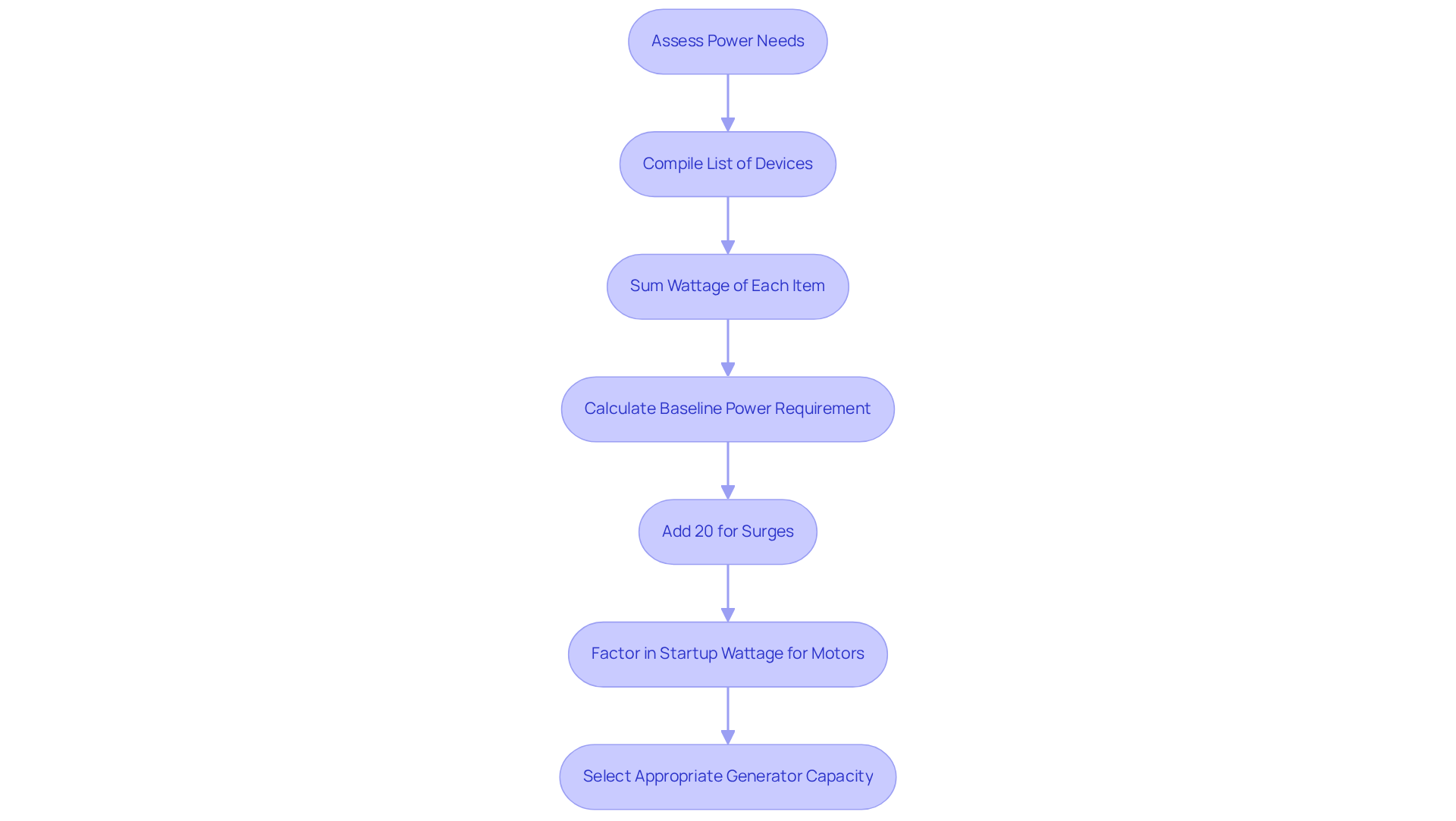
Evaluate Fuel Options: Select Between Diesel, Gasoline, or Propane Generators
Selecting the appropriate fuel type for your power source is essential for enhancing task efficiency. Diesel units excel in fuel efficiency, longevity, and their ability to manage heavier and more variable loads over extended periods. This makes them particularly ideal for long-term projects and heavy-duty applications. Notably, diesel units can operate for 500 hours before requiring an oil change, whereas propane units typically need maintenance after just 100 hours, underscoring their reduced maintenance requirements.
In contrast, gasoline-powered devices often present a more economical initial investment; however, they are better suited for smaller, occasional tasks. Propane units, while providing cleaner emissions and easier storage, may not deliver the same power output as diesel. They do produce fewer emissions than diesel, which can be a crucial consideration in regulated areas. As you evaluate your project's duration and fuel availability, it's vital to consider how each fuel option aligns with your operational needs to ensure seamless execution.
Significantly, diesel fuel offers around 35 Megajoules per liter, while propane delivers 26 MJ/L. This highlights the energy efficiency of diesel systems, reinforcing their reliability for demanding applications. By understanding these differences, you can make an informed decision that optimally supports your project requirements.
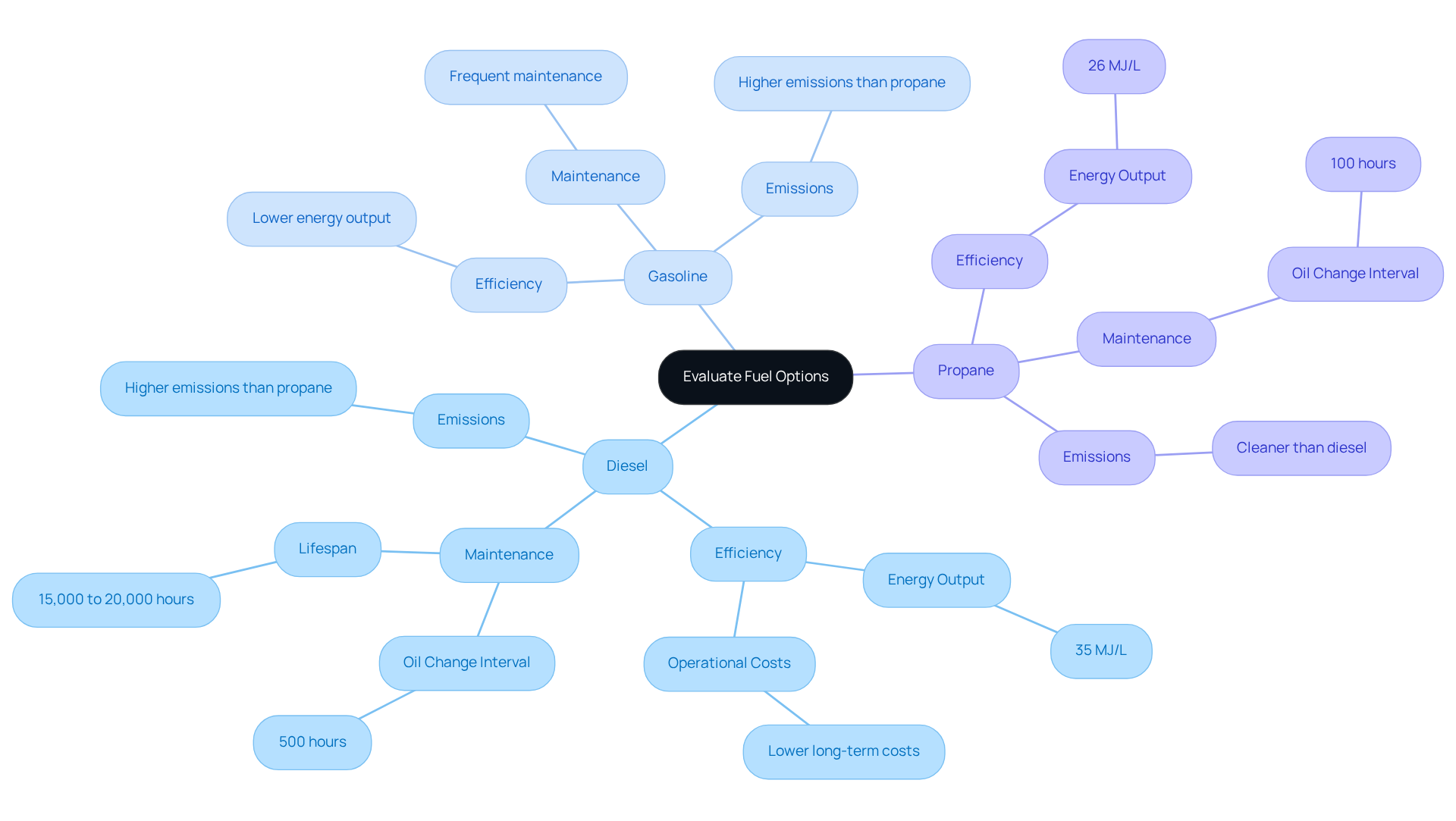
Review Maintenance Records: Ensure Generator Reliability and Performance
Before concluding your rental, it is essential to request the maintenance logs for the equipment. A well-maintained power source is significantly less likely to fail, which is crucial for keeping your project on schedule. Statistics indicate that aging equipment is the leading cause of unplanned downtime, with 44% of respondents in a recent survey identifying it as a primary issue. Regular servicing not only prolongs the lifespan of the machine but also avoids expensive repairs that can interrupt operations; in fact, delayed maintenance expenses can be 3 to 10 times greater than routine maintenance.
Look for records that demonstrate consistent maintenance practices, such as:
- Oil changes every six months or after 50 hours of operation, especially in dusty conditions
- Any repairs that have been conducted
This proactive method of managing power sources can save your project from unforeseen delays, as emergency repair expenses from reactive upkeep are considerably greater than those from proactive upkeep. Keeping a maintenance log is also crucial, as it helps track completed tasks and ensures no essential checks are overlooked.
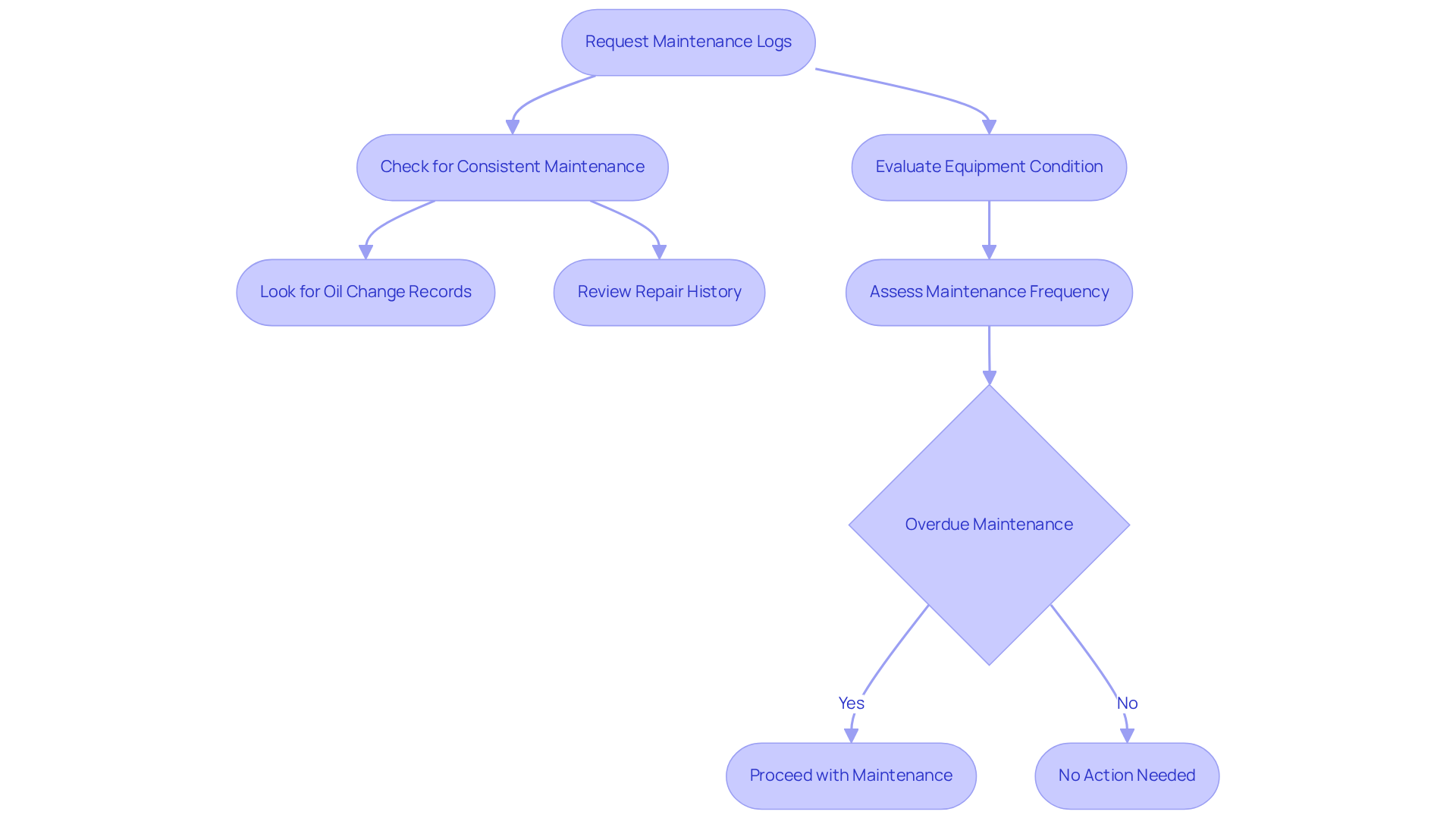
Understand Rental Agreements: Clarify Terms, Costs, and Responsibilities
Thoroughly examining the lease agreement before signing is crucial for a successful generator leasing experience. Begin by scrutinizing key elements such as lease duration, total costs, and any additional fees related to delivery or maintenance. It's vital to clarify your responsibilities regarding fuel refills and the upkeep of the equipment during the lease period.
Conflicts often arise from ambiguous lease terms, with statistics indicating that a significant percentage of lease agreements lead to misunderstandings. Legal experts stress the necessity of clearly defined responsibilities in equipment leasing to prevent potential disputes. For example, vague terms concerning maintenance obligations can lead to disagreements over liability for damages or operational failures.
When entering into a rental agreement for equipment, it is essential to review specific clauses related to fuel management, maintenance duties, and penalties for delayed returns. Understanding these details can mitigate risks and enhance the efficiency of your operations. Take action now—ensure you are fully informed and prepared for a seamless leasing experience.
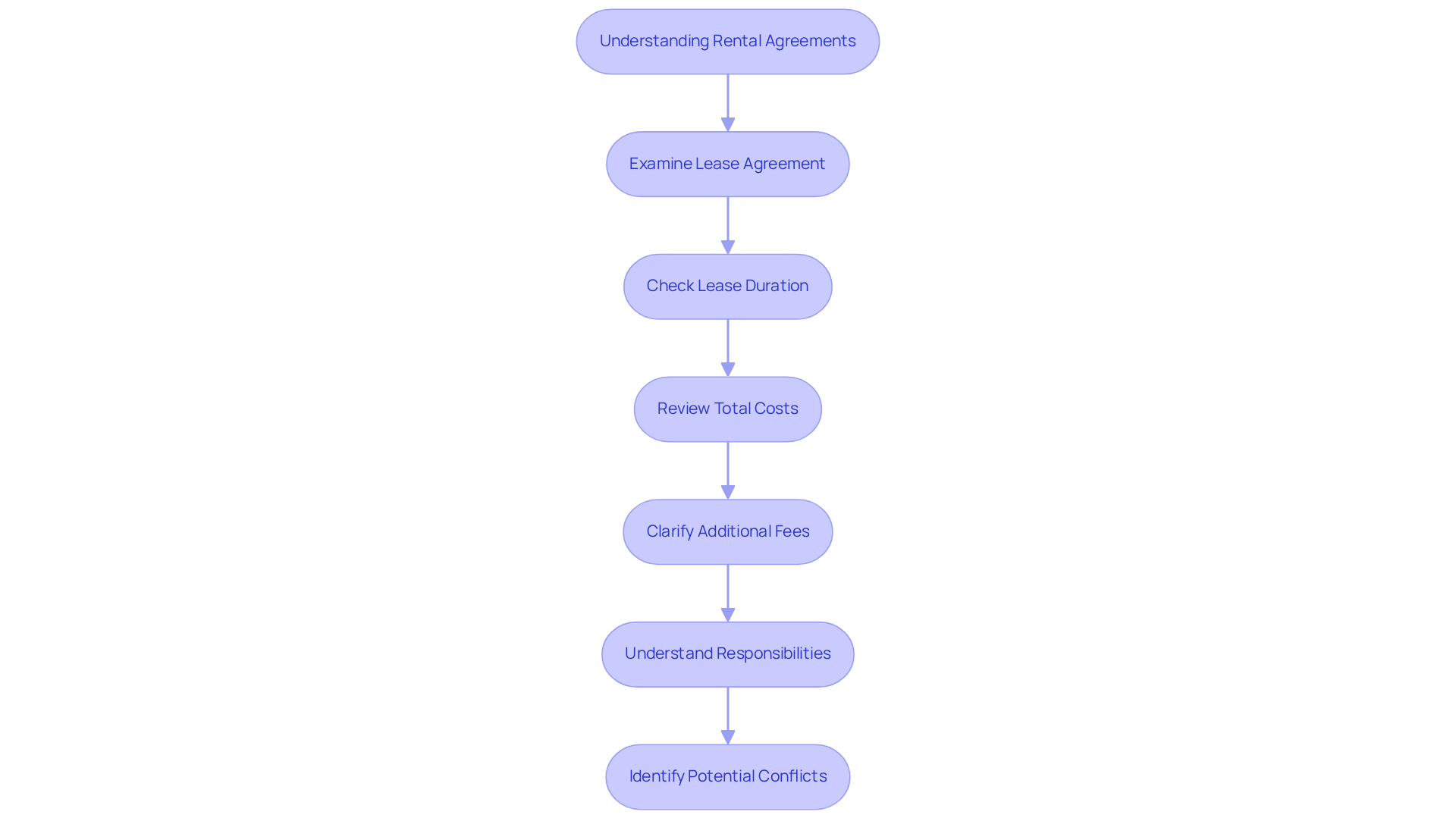
Consider Noise Levels: Choose Generators That Meet Local Regulations
When leasing a power source, it is crucial to consider its noise level, particularly for projects located in residential neighborhoods. Local regulations often dictate permissible noise levels, typically around 65 dBA during the day and dropping to 55 dBA at night. Non-compliance can lead to fines and complaints from neighbors, making it essential to familiarize yourself with these guidelines. By prioritizing noise management, you can ensure smoother operations while maintaining good relations with the surrounding community.
Choosing quieter types, such as inverter units, can significantly lessen noise impact. Certain Honda models operate just under 68 dBA, offering a reliable option for those concerned about sound levels. Furthermore, selecting devices equipped with soundproofing features or utilizing noise-reduction tools can further minimize disturbances. For example, placing the machine at least 20 feet away from living areas can effectively mitigate noise levels, as this distance can substantially reduce sound impact.
Remember, following local noise regulations is not merely about compliance; it’s about creating a positive atmosphere for your endeavor. By taking these considerations into account, you not only adhere to regulations but also foster a harmonious relationship with the community. Engage with us today to explore our range of quiet power solutions that meet your project needs.
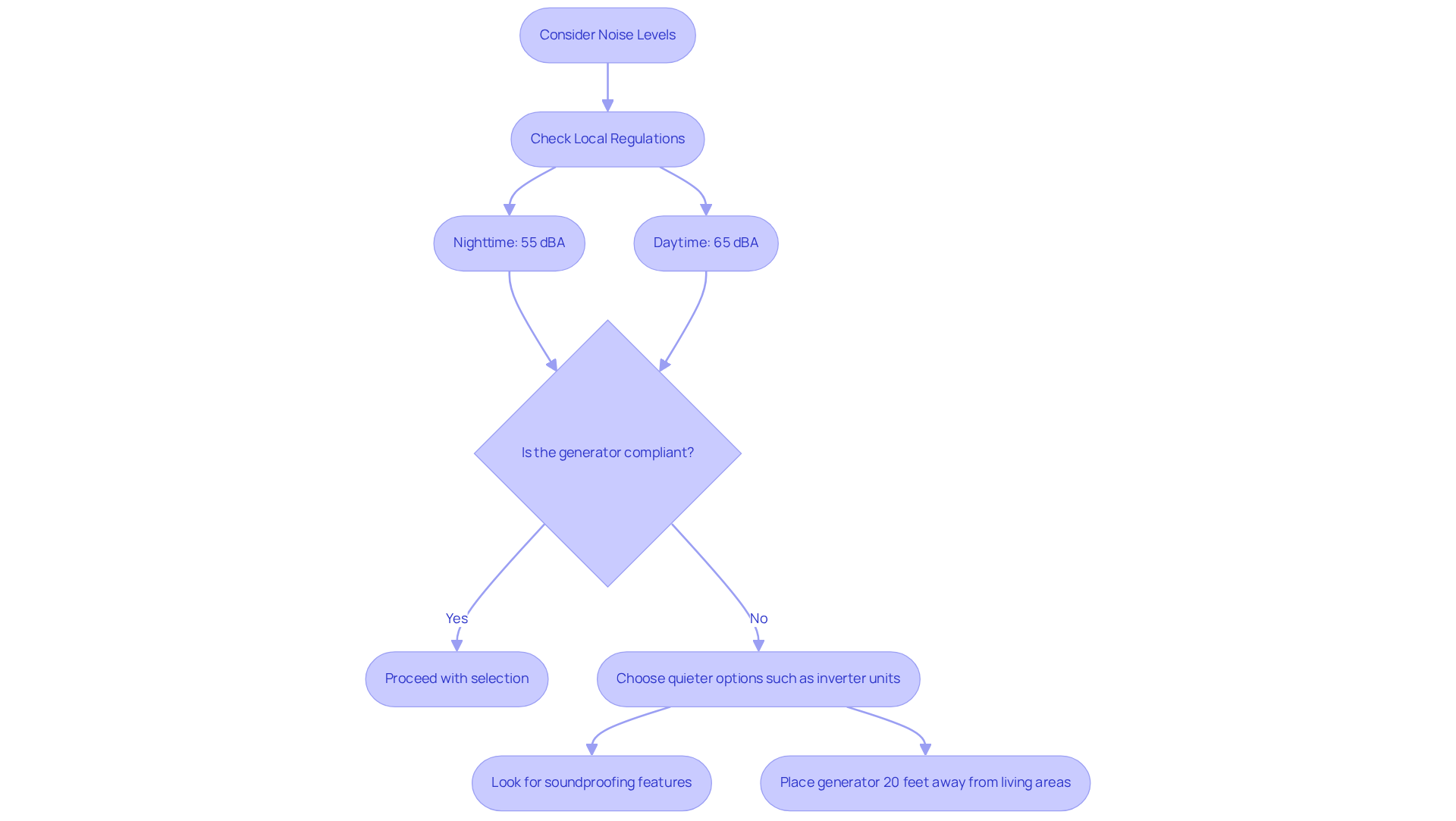
Inquire About Delivery Services: Ensure Timely Access to Your Generator
Inquire with your rental provider about their delivery options to ensure timely access to your equipment. Timely delivery is crucial in avoiding delays, particularly because construction has the second highest rate of work-related fatalities, often exacerbated by logistical challenges. Confirm the delivery schedule and any associated costs to ensure your generator arrives exactly when you need it. Industry insights reveal that delays in machinery leasing services can significantly impact project timelines, with statistics indicating that 86% of machinery-related delays stem from logistical issues. By asking the right questions about delivery services, you can help mitigate these risks. For example, ask about the provider's history with on-time deliveries and any contingency plans they have for unforeseen circumstances.
Furthermore, EZ Equipment Rental offers flexible leasing contracts that allow you to adjust your equipment needs as your project evolves. Their commitment to exceptional customer service ensures that you receive support throughout the leasing process. By prioritizing these discussions, you can enhance your project's efficiency and ensure that your generator lease aligns seamlessly with your construction timeline.
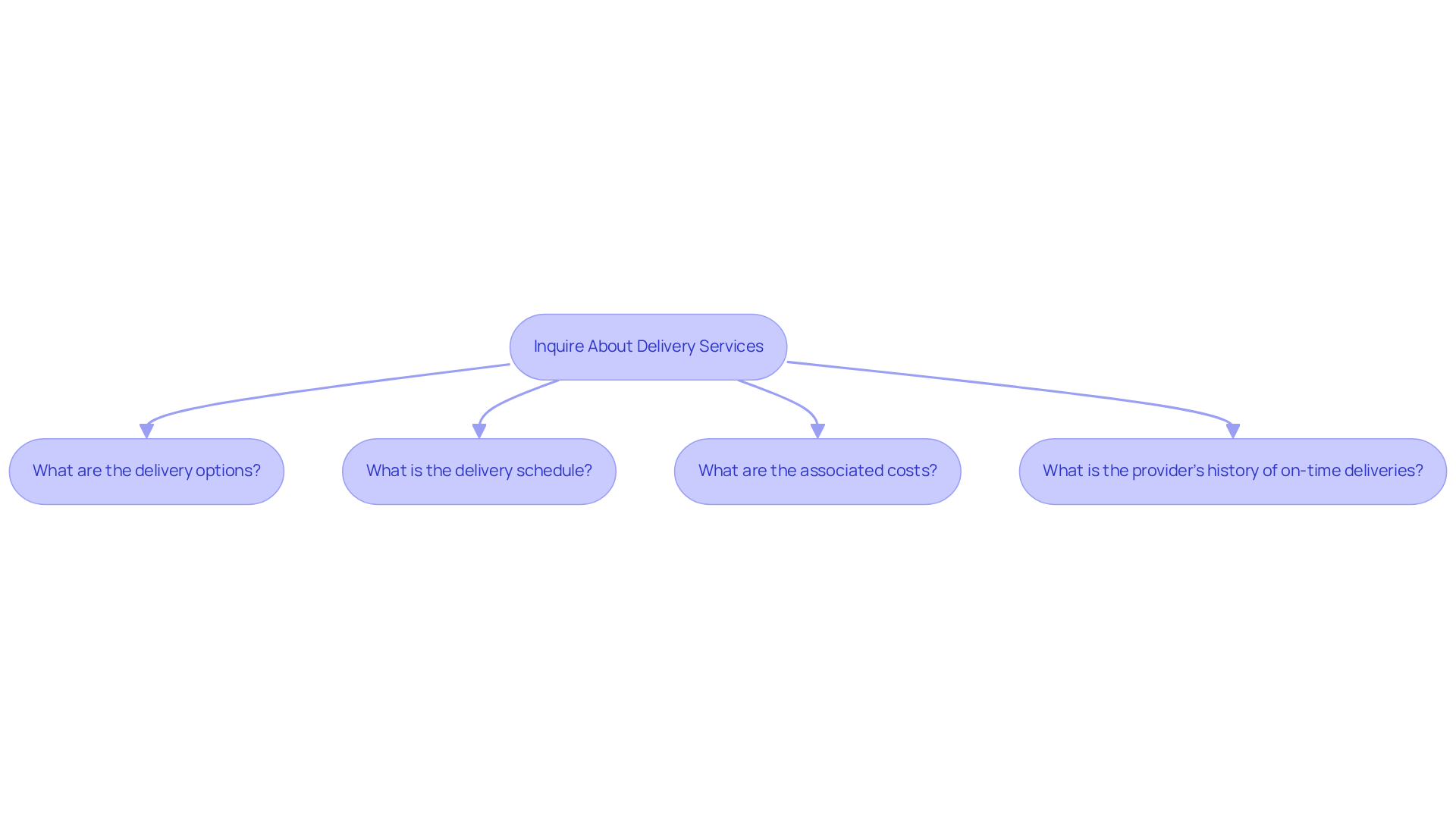
Check Customer Support: Ensure Assistance is Available When Needed
Before concluding your lease, it is crucial to assess the customer support services provided by the leasing company. A robust support network is vital; 70% of construction supervisors emphasize the need for prompt assistance during construction generator rental to avert work delays. Ensure that help is readily available throughout your rental period for troubleshooting or maintenance issues.
EZ Equipment Rental in Dallas, TX, operates Monday to Friday from 7:30 AM to 5:30 PM and Saturday from 7:30 AM to 5:00 PM, guaranteeing that support is accessible during these hours. Insufficient support can lead to significant downtime, with projects potentially facing delays of up to 30% due to equipment failures that could have been resolved with timely assistance, including the use of a construction generator rental.
For example, a recent construction project benefited immensely from immediate support with construction generator rental, allowing them to complete their tasks ahead of schedule. When evaluating rental companies, consider their responsiveness and the availability of support staff. A company that prioritizes customer service, like EZ Equipment Rental, can profoundly impact keeping your project on track and minimizing disruptions.
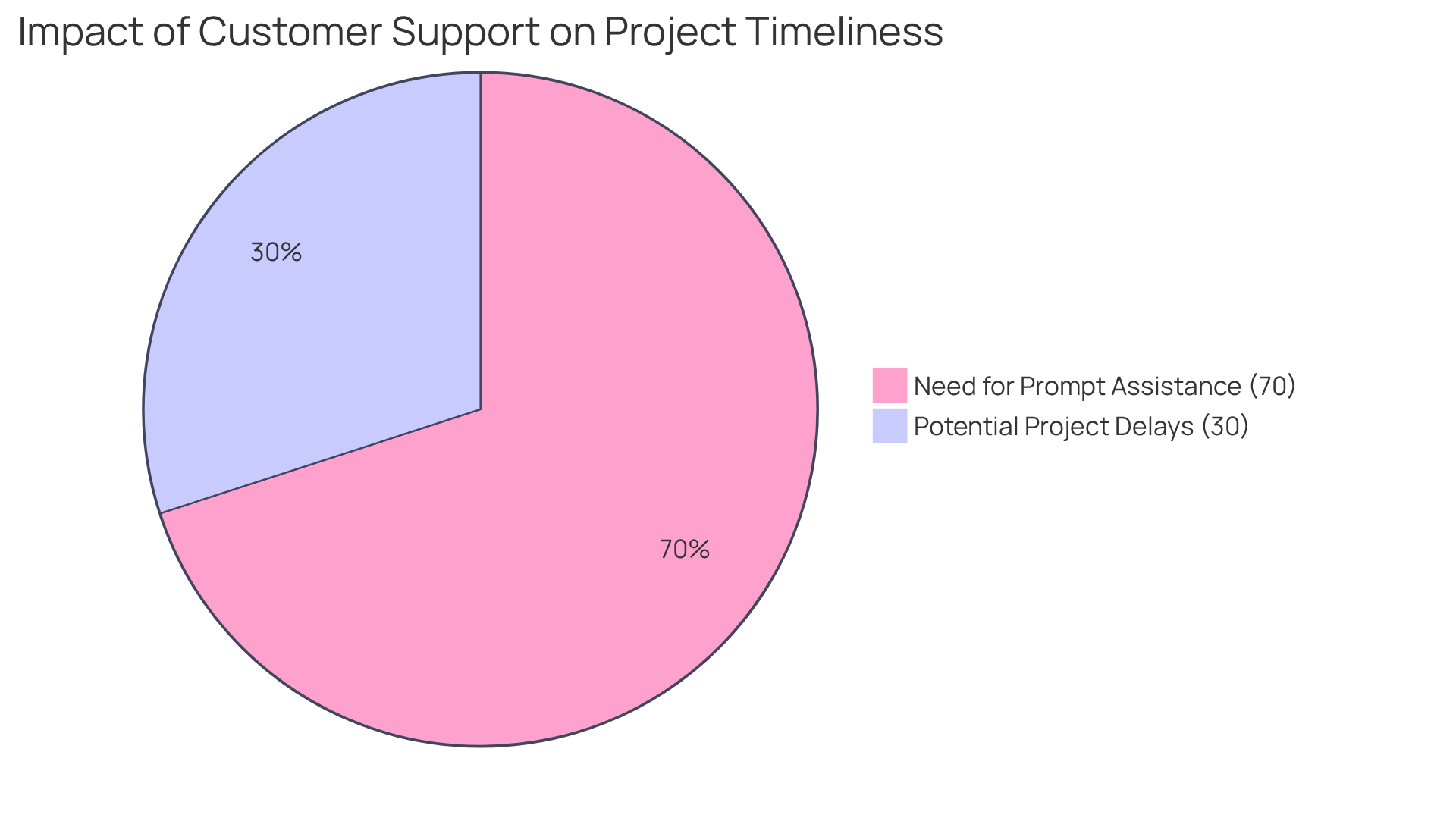
Compare Rental Prices: Find the Best Value for Your Generator Needs
When renting generators, it is essential to compare prices from various providers. However, do not limit your focus to the base leasing cost; additional fees for delivery, maintenance, and fuel can significantly influence your total expenditure. For example, many leasing firms may impose extra charges for delivery and setup, which can accumulate rapidly. Understanding these costs is critical for making an informed decision.
In 2025, leasing rates are projected to experience only a modest rise of one to two percent. Nevertheless, the overall cost structure may shift due to increasing operational expenses. Therefore, assessing the entire leasing package that includes construction generator rental rather than solely the initial cost will aid you in uncovering the best value for your generator requirements.
Projects that have utilized comprehensive leasing packages often report enhanced efficiency and cost savings. This demonstrates the importance of thorough cost analysis in the leasing process, ensuring you make the most informed choice possible.
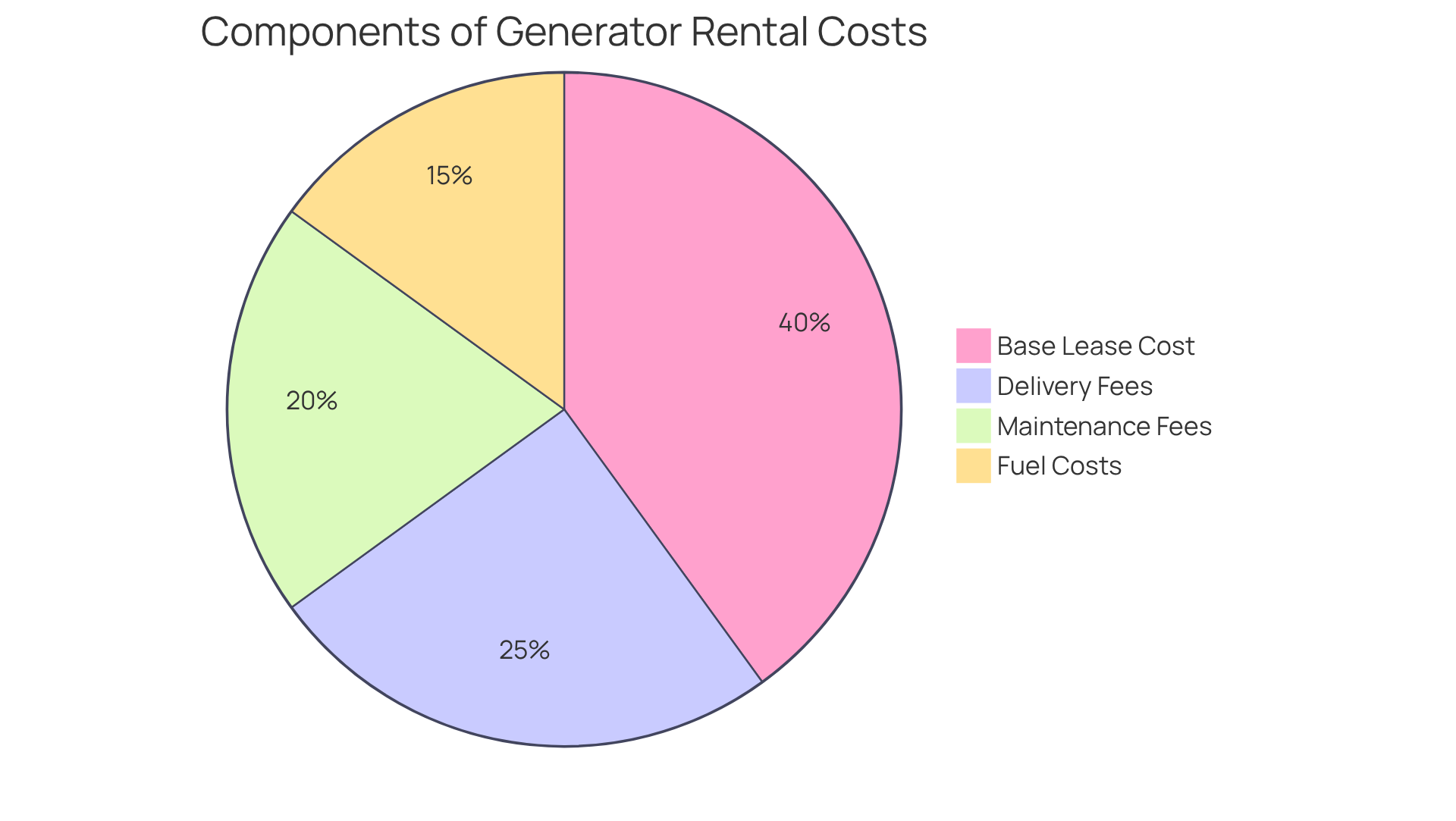
Read Customer Reviews: Gain Insights on Rental Company Performance
Before concluding a leasing choice, it is essential to explore customer reviews and testimonials about EZ Equipment Rental. Focus on feedback related to equipment quality, customer service, and overall satisfaction. Research indicates that 93% of consumers consider online reviews influential in their purchasing decisions, underscoring the importance of this step. Furthermore, 80% of consumers were prompted by a local business to leave a review, highlighting the proactive role companies like EZ Equipment Rental can take in managing their reputation.
Positive reviews can significantly enhance a company's reputation, while negative feedback can deter potential customers—92% of consumers are less likely to engage with a business after encountering negative reviews. Additionally, four out of five customers reconsider a purchase after reading a negative review, emphasizing the critical nature of managing online reputation.
By thoroughly evaluating customer feedback and noting how EZ Equipment Leasing responds to reviews—companies that reply to at least 30% of reviews see an 80% higher conversion rate—you can select a leasing partner that not only meets your assignment requirements but also aligns with your expectations for quality and service. This approach not only aids in making informed choices but also contributes to a smoother rental experience, ultimately leading to project success.
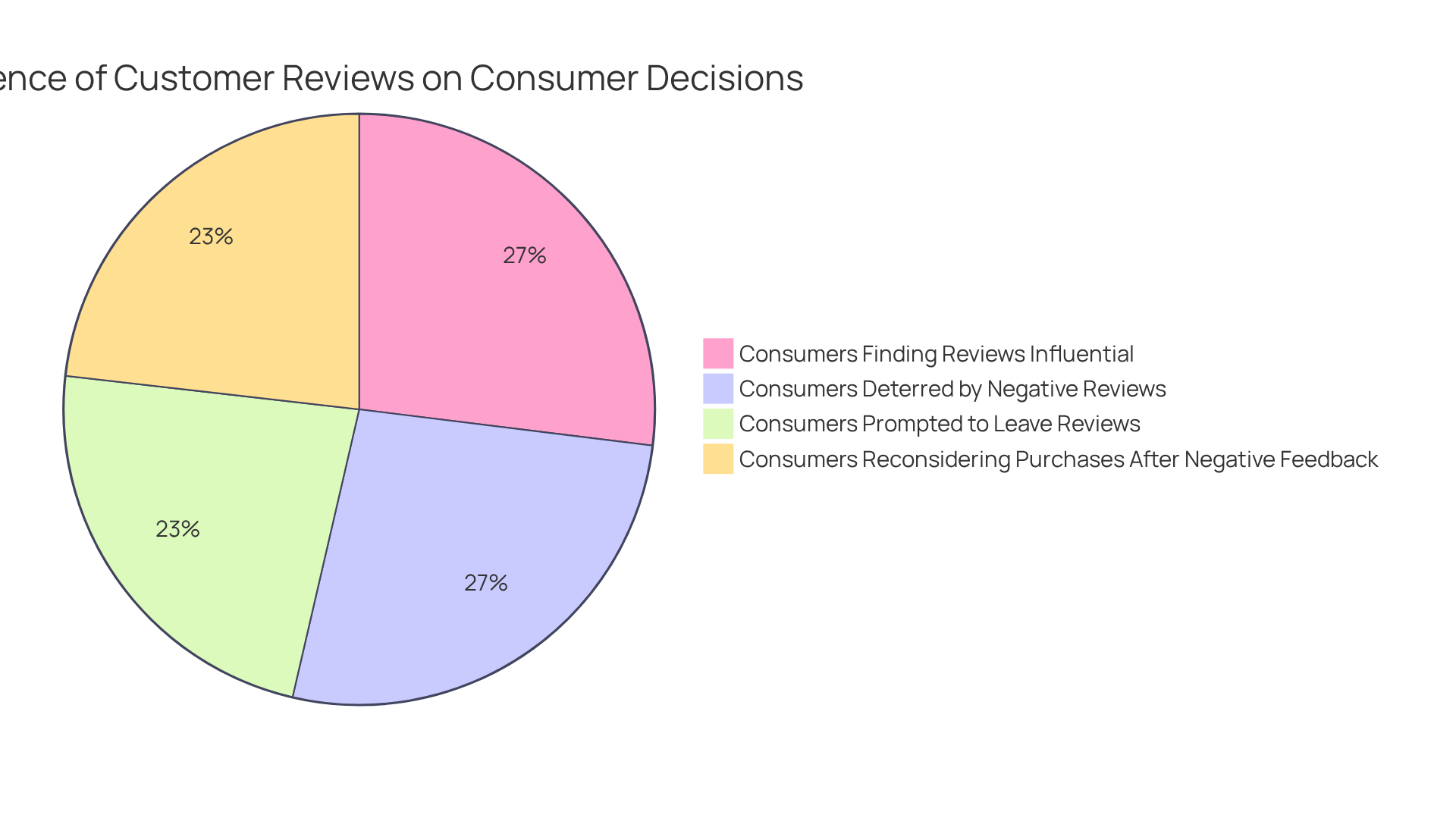
Conclusion
Choosing the right construction generator rental is crucial for ensuring project success. Understanding the essential steps outlined in this article—selecting a reliable rental partner like EZ Equipment Rental, assessing power needs, and evaluating fuel options—enables project managers to significantly enhance operational efficiency. Each tip reinforces the importance of thorough planning and informed decision-making in the generator rental process.
Key insights, such as the necessity of reviewing maintenance records, understanding rental agreements, and considering noise levels, highlight the multifaceted nature of generator rentals. Furthermore, the emphasis on customer support and timely delivery underscores the importance of having a dependable partner throughout the rental period. By following these guidelines, construction professionals can mitigate risks associated with equipment failures and logistical challenges.
Ultimately, the success of a construction project hinges on the ability to secure the right tools and support. Engaging with trusted rental companies, conducting thorough research, and prioritizing clear communication can pave the way for smoother and more efficient project execution. Take action today by applying these tips to ensure that your next generator rental experience is both seamless and productive.
Frequently Asked Questions
What does EZ Equipment Rental offer for construction generator rentals?
EZ Equipment Rental provides a diverse selection of construction generator rentals, including commercial, diesel, electric, and towable units, tailored to meet various task requirements.
Why should I choose EZ Equipment Rental for my construction equipment needs?
EZ Equipment Rental is recognized for its commitment to customer service and reliability, ensuring clients have dependable tools to focus on their projects without concerns about equipment failures or service disruptions.
How can I determine the right generator capacity for my project?
To determine the right generator capacity, compile a list of all devices needing power and sum their wattage. It is advisable to select a power source that can handle at least 20% more than your calculated needs to accommodate unexpected power surges.
What are the different fuel options available for generators, and how do they differ?
The main fuel options for generators are diesel, gasoline, and propane. Diesel units are fuel-efficient and ideal for long-term, heavy-duty applications, while gasoline units are more economical for smaller tasks. Propane offers cleaner emissions but may deliver less power than diesel.
What are the maintenance requirements for different types of generators?
Diesel units can operate for approximately 500 hours before requiring an oil change, while propane units typically need maintenance after around 100 hours. Gasoline-powered devices may also require more frequent maintenance compared to diesel.
How does fuel efficiency compare among diesel, gasoline, and propane?
Diesel fuel offers around 35 Megajoules per liter, making it more energy-efficient for demanding applications, while propane delivers 26 Megajoules per liter. This highlights diesel's reliability for heavy workloads.
What factors should I consider when selecting a fuel type for my generator?
Consider the duration of your project, fuel availability, and how each fuel option aligns with your operational needs to ensure seamless execution while enhancing task efficiency.




